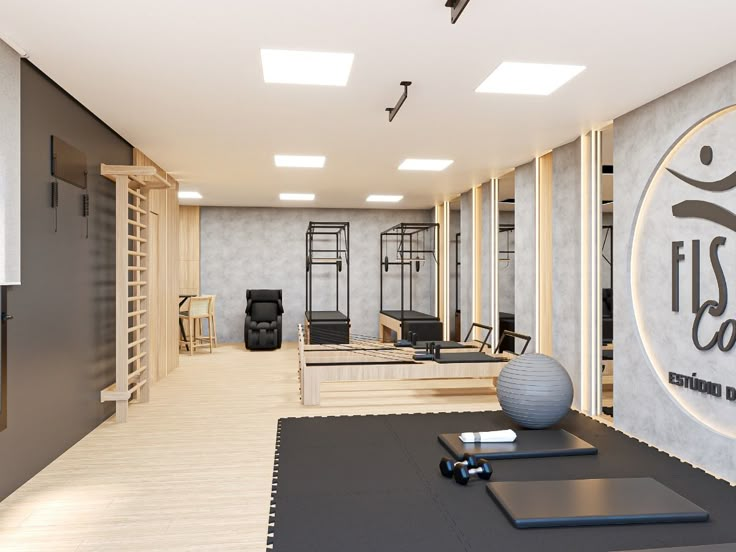
Synapse Physiotherapy
Best Physio Near Me for Elderly Mobility & Balance
Are you or a loved one searching for “physio near me” to seek specialized physiotherapy to improve mobility and balance in later years? Finding the right physiotherapist specializing in elderly care can significantly enhance quality of life and independence. At Synapse Physiotherapy, we understand the unique challenges faced by seniors and offer tailored physiotherapy programs designed to address mobility issues and improve balance effectively.
The Importance of Mobility for Seniors
Understanding the Benefits of Mobility
Mobility is much more than just the ability to walk quickly or move without pain—it is fundamental to maintaining overall health, independence, and a high quality of life in older age. Staying active has profound physical, mental, and emotional benefits for seniors. Engaging in regular movement, whether through walking, tai chi, swimming, or even gardening, can significantly enhance well-being in numerous ways:
- Improved Cardiovascular Health: Movement helps maintain heart health, regulate blood pressure, and reduce the risk of heart disease and stroke.
- Enhanced Balance and Fall Prevention: Regular activity strengthens muscles and joints, improving stability and reducing the risk of falls.
- Cognitive Function Support: Physical activity has been linked to better memory, mental sharpness, and a lower risk of cognitive decline and dementia.
- Boosted Immune System: Regular exercise can enhance immune responses, helping the body fight infections and illnesses more effectively.
- Pain Reduction: Gentle movements like stretching and mobility exercises can alleviate pain from arthritis, joint stiffness, and other chronic conditions.
- Mood and Mental Health Benefits: Exercise releases endorphins, which improve mood, alleviate stress, and reduce the risk of anxiety and depression.
For seniors, maintaining mobility is directly linked to staying independent longer, allowing them to perform daily tasks with ease and continue participating in activities they enjoy.
Common Mobility Issues in Older Adults
Aging affects everyone differently, but certain mobility challenges are more prevalent among seniors. Many of these issues stem from musculoskeletal and neurological changes that impact movement, balance, and coordination. Some of the most common mobility-related concerns include:
- Arthritis: Joint inflammation can lead to stiffness and pain, limiting movement and affecting daily activities.
- Osteoporosis: Weak and brittle bones increase the risk of fractures, making mobility more challenging.
- Loss of Muscle Mass (Sarcopenia): As people age, muscle strength naturally declines, leading to reduced endurance and mobility issues.
- Neuropathy: Nerve damage, often linked to conditions like diabetes, can result in numbness, tingling, and difficulty walking.
- Parkinson’s Disease and Neurological Disorders: These conditions affect coordination, balance, and muscle control, making movement unpredictable.
- Balance Disorders: Conditions like vertigo or inner ear problems can make standing and walking difficult, increasing fall risk.
Recognizing and addressing these issues early can help seniors maintain their mobility for longer and prevent complications that lead to reduced independence.
Strategies for Improving and Maintaining Mobility
Fortunately, there are many ways seniors can preserve and even improve their mobility, ensuring they stay active and independent. A well-rounded approach includes:
- Regular Low-Impact Exercise: Activities like walking, swimming, and cycling provide cardiovascular benefits while being gentle on the joints.
- Strength Training: Light resistance training using weights or resistance bands can help rebuild muscle mass and prevent weakness.
- Flexibility and Stretching Exercises: Yoga and stretching routines enhance range of motion, reduce stiffness, and improve circulation.
- Balance and Coordination Training: Specific exercises like standing on one foot, heel-to-toe walking, or using stability balls can help prevent falls.
- Physical Therapy: A trained physiotherapist can develop personalized movement strategies to improve mobility, relieve pain, and address balance concerns.
- Assistive Devices: Using canes, walkers, or orthotic supports when necessary can enhance mobility and provide additional stability.
- Proper Footwear and Posture Awareness: Wearing supportive shoes and practicing good posture can help prevent unnecessary strain and injuries.
- Healthy Diet and Hydration: Nutrition plays a crucial role in maintaining muscle strength, bone density, and joint health. Proper hydration is also essential for flexibility and circulation.
- Regular Health Checkups: Identifying and addressing mobility-related issues early through medical evaluations can help prevent them from worsening.
- Engagement in Social Activities: Participating in group exercise classes, dance programs, or outdoor activities can make movement more enjoyable and sustainable.
The Importance of Maintaining Balance as We Age
As we grow older, prioritizing our health becomes increasingly essential. This includes regular medical checkups and lifestyle adjustments to prevent chronic diseases. A crucial yet often overlooked aspect of aging well is maintaining and improving balance. Since balance naturally declines over time, it’s vital to engage in activities that help preserve it—after all, if we don’t use it, we risk losing it.
Good balance is essential for nearly every movement we make, from walking and stepping over uneven terrain to quickly changing direction, standing up from a chair, and bending down to tie our shoes.
What is Balance and Why is it Important?
Balance refers to the ability to maintain control over your body’s position, whether you’re standing still (such as holding a yoga pose) or in motion (like walking or getting up from a seated position). Staying upright and stable while moving requires constant coordination between various bodily systems, making balance a complex but essential function.
Three key systems work together to provide the sensory information needed for maintaining balance:
- Visual System: The eyes help detect movement and spatial orientation.
- Vestibular System: Located in the inner ear, this system monitors motion, head positioning, and spatial awareness.
- Somatosensory System: Sensory receptors in the joints, muscles, and skin (particularly in the ankles, knees, spine, and neck) provide feedback about body positioning and movement.
The brain continuously integrates and processes information from these three systems to maintain stability. However, as we age, this process can become less efficient, making older adults more susceptible to falls and balance-related issues.
The Benefits of Balance Exercises
Incorporating balance training into a regular fitness routine offers numerous advantages, including:
- Fall Prevention: Strengthening core and limb control helps improve stability, allowing for quicker adjustments to sudden changes in body position. This reduces the risk of tripping over unseen obstacles or uneven surfaces.
- Lower Risk of Injuries: Enhanced balance minimizes the likelihood of falls, which can lead to severe injuries like fractures or sprains. It also boosts confidence, reducing fear and anxiety about movement, particularly outdoors.
- Improved Proprioception: Balance exercises enhance proprioception—the body’s ability to sense its position in space. This heightened awareness helps with coordination and movement efficiency, leading to better overall mobility.
By consistently working on balance, older adults can maintain their independence, reduce fall-related risks, and continue engaging in daily activities with confidence and ease.
Why Choose Synapse Physiotherapy?
At Synapse Physiotherapy, we are dedicated to providing top-tier physiotherapy services for elderly mobility and balance. Our commitment to excellence and patient-centered care makes us the preferred choice for many seniors looking to improve their movement, strength, and overall quality of life.
What Sets Us Apart?
- Specialized Expertise in Geriatric Physiotherapy
Our highly skilled physiotherapists have extensive training in geriatric care, specializing in conditions such as arthritis, osteoporosis, Parkinson’s disease, and post-stroke rehabilitation. We understand the complexities of aging and tailor our treatments accordingly. - Personalized Treatment Plans
No two individuals are the same, and neither are their mobility needs. Our team designs customized physiotherapy plans to address each patient’s unique challenges, ensuring a targeted approach for optimal recovery and independence. - Comprehensive Assessments for Tailored Care
Before starting any treatment, we conduct detailed assessments to identify the root cause of mobility issues. This allows us to develop precise interventions that deliver the best possible outcomes. - Evidence-Based Physiotherapy Techniques
Our treatments are rooted in the latest scientific research and physiotherapy best practices. We integrate modern techniques and innovative rehabilitation strategies to maximize treatment effectiveness. - A Holistic Approach to Senior Wellness
Beyond treating mobility limitations, we focus on overall well-being, independence, and quality of life. Our programs help seniors regain confidence in their movements and maintain an active lifestyle.
Our Specialized Services
At Synapse Physiotherapy, we go beyond traditional physiotherapy by offering a Silver Fitness Program—a specialized fitness program designed exclusively for seniors. Think of it as a “gym for the elderly”, where we emphasize:
Strength Training: Helps build muscle mass, improve endurance, and enhance mobility.
Flexibility Exercises: Increases range of motion and prevents stiffness.
Cardiovascular Workouts: Boosts heart health and improves stamina for daily activities.
Balance and Stability Training: Essential for fall prevention and maintaining confidence in movement.
Additionally, we offer:
- Gait Training: Focused on refining walking patterns, stability, and coordination.
- Fall Prevention Programs: Practical strategies to reduce fall risks and improve home safety.
By combining physiotherapy with targeted exercise programs, we empower seniors to maintain their independence and continue enjoying life to the fullest.
Regain Your Mobility & Confidence with Synapse Physiotherapy!
Whether you’re looking to improve balance, regain strength, or prevent falls, Synapse Physiotherapy is here to help. Contact us today to schedule an assessment and take the first step toward a healthier, more active future! 🚶♂️✨
Tags :

Back & Neck Pain
Conditions such as stiffness, postural abnormalities and muscle overuse from prolonged desk work at the office or home is more prevalent than most would think. We provide the necessary tools to fix you up and educate you on ergonomics which can unload unnecessary stress.
- Spine & Core Rehabilitation
- Strength & Conditioning Programme
- Pain Management
- Biomechanical Assessment
- Sports Physiotherapy
- Group Class
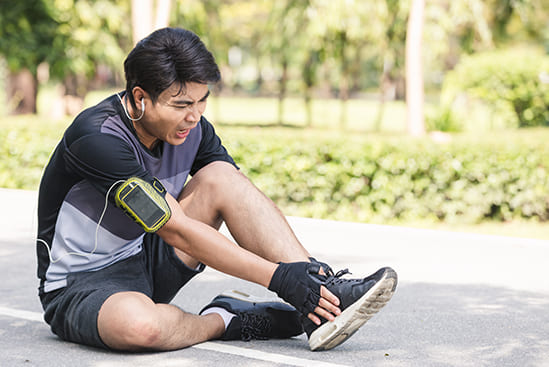
Sports Injuries
Rolled ankles, jarred knees, impinged shoulders are few conditions in the plethora of sports injuries which can hamper performance and limit our enjoyment of sports. Physiotherapy not only treats the symptoms of these conditions but propels your overall fitness to greater heights.
- Strength & Conditioning Programme
- Pain Management
- Biomechanical Assessment
- Sports Physiotherapy
- Shockwave Therapy
- Group Class

Work Desk Injuries
Conditions such as stiffness, postural abnormalities and muscle overuse from prolonged desk work at the office or home is more prevalent than most would think. We provide the necessary tools to fix you up and educate you on ergonomics which can unload unnecessary stress.
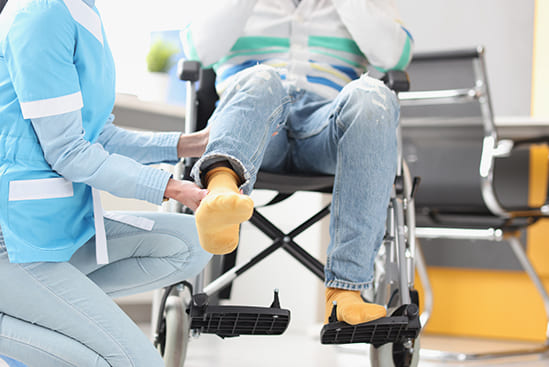
Pre-Post-Surgical Conditions
Surgery involves going through preparation both before and after. Physiotherapists play a vital role in getting your body ready for surgeries with circulatory, breathing and strengthening exercises. After the procedure, let us be there for your recovery and rehabilitation, taking it one step at a time.

Scoliosis & Postural Abnormalities
The way we stand, sit, walk and sleep has influence over our posture and the overall balance of muscles controlling its alignment. A comprehensive screening can be done by our physiotherapists to detect abnormalities, which we will aid in correcting.
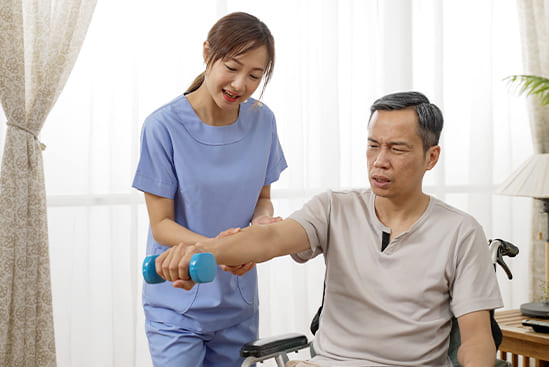
Neurological Conditions
Neurological disabilities such as stroke, nerve compression and neuropathies can be barriers for patients to live life to its fullest. We at Synapse are committed to help you overcome these hurdles by ensuring functional mobility and quality of life is at its optimum by providing the right treatment and exercises.
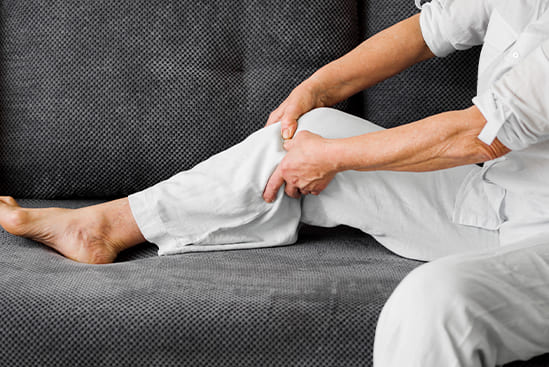
Osteoarthritis & Rheumatism
Joint degeneration and inflammation happens as the human body grows older, but that does not mean our way of life degenerates as well. Relief your joint pains with a joint effort together with your physiotherapist, who will provide pain-relief treatments and prescribe exercises for your wellbeing.
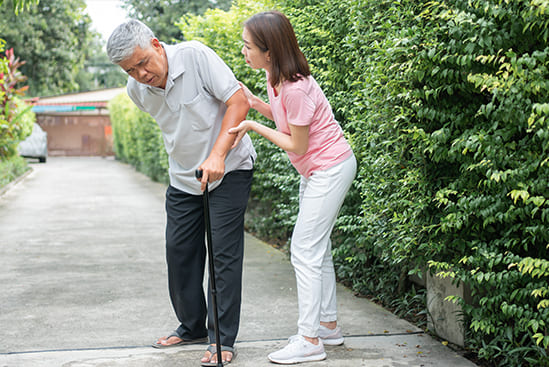
Conditions Relating To Elderly
Common conditions in the older age population include hips & knee pain, back & neck pain, osteoarthritis, rheumatism, fear of falling and many more. Aging and degeneration of bodily function is inevitable, but here at Synapse, we will help you live the best of your life.
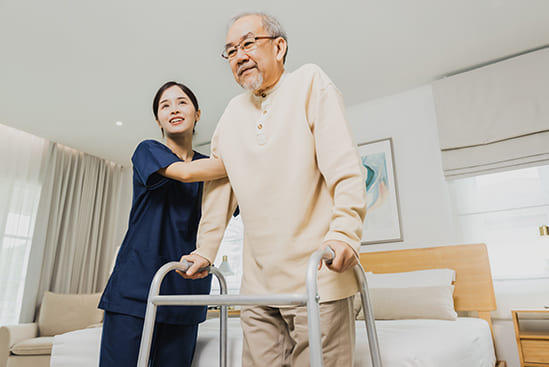
Home Physiotherapy
We understand that some conditions or injuries can make it difficult to receive rehabilitation at our clinic be it mobility or transportation issues. Our objective is to provide you with the same high-quality physiotherapy services at home that you would receive in-clinic.
